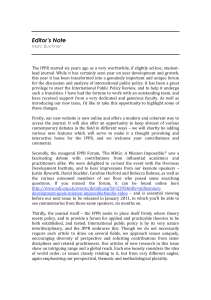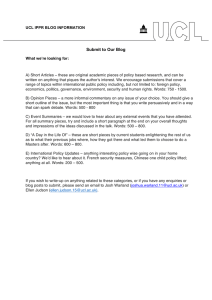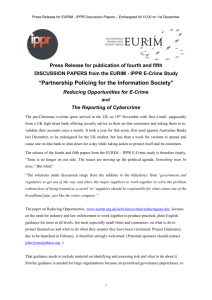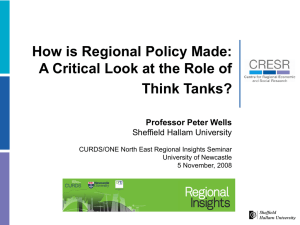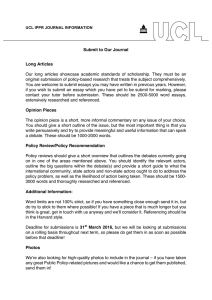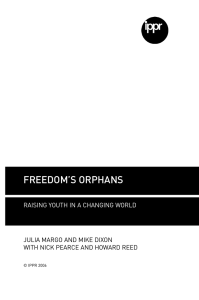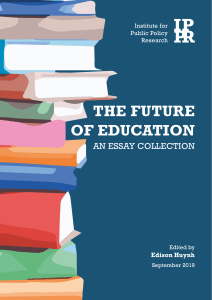! $ #,,& -
advertisement
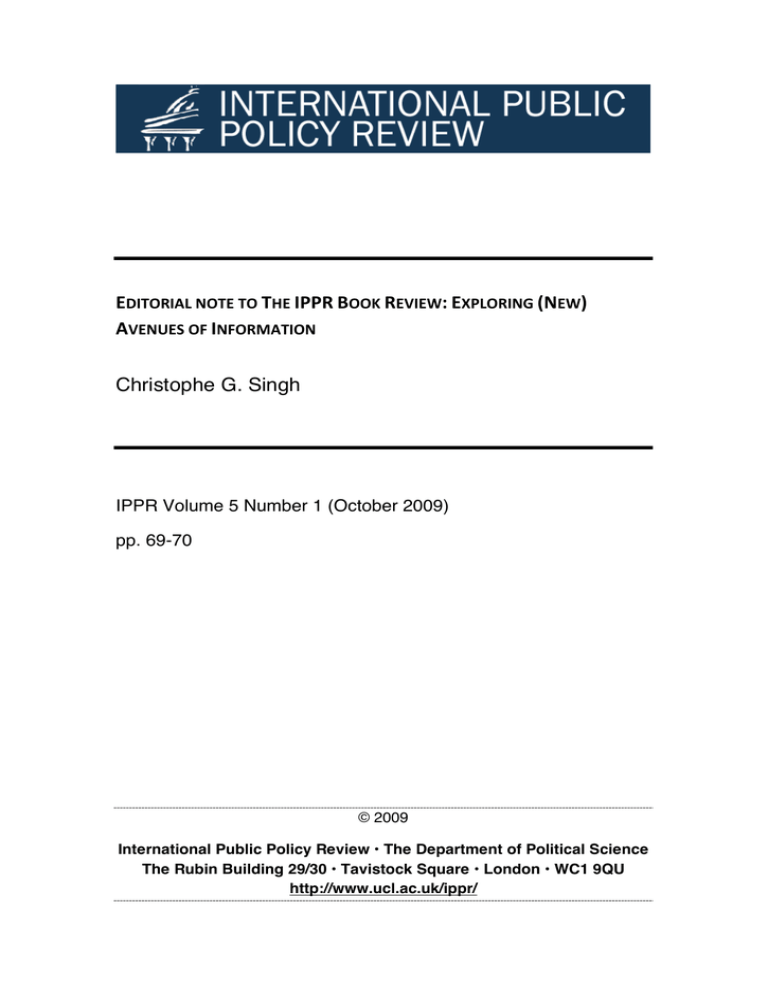
!"#$%&#'()*%$!)$%)$+!)#,,&)-%%.)&!/#!01)!2,(%&#*3)4*!05) '/!*6!7)%8)#*8%&9'$#%*) ! Christophe G. Singh IPPR Volume 5 Number 1 (October 2009) pp. 69-70 © 2009 International Public Policy Review • The Department of Political Science The Rubin Building 29/30 • Tavistock Square • London • WC1 9QU http://www.ucl.ac.uk/ippr/ 98) !"#$%"&#!'"&()*+,(!-)*'(!-.)%$/!$0))))))1))))/'(2)34)"'2)5))1)))'-#',$%))6778)) ) ) EDITORIAL NOTE TO THE IPPR BOOK REVIEW EXPLORING (NEW) AVENUES OF INFORMATION * Welcome to the International Public Policy Review Book Review section. The IPPR Book Review is a new addition to the IPPR, starting with IPPR Volume Five, Issue One. The Editorial Board for Volume Five established the IPPR Book Review last year to provide an additional forum within the journal to bring practitioners (and scholars) up to speed with contemporary developments within the field of International Public Policy (IPP). The book reviews aim to be brief and sharp assessments, or prognostications, of topical issues within the field of IPP and should provide the reader with concise ‘take away’ snapshots. The reviews may also include re-appraisals of seminal texts within the field of IPP and more broadly that of Political Science. This first edition of the IPPR Book Review section brings together five scholars to review six works dealing with multiple subfields of IPP, namely those of European Public Policy, International Political Economy, International Security and (more broadly) Theories of International Relations. As a special tribute to the late Samuel P. Huntington1, Dr. Alex Braithwaite —Lecturer in International Relations in the Department of Political Science at the School of Public Policy, University College London (UCL) — revisits Huntington’s seminal work The Clash of Civilizations and demonstrates its enduring relevance to the field of International Security in the post 9/11 era. Dr. Harry Bauer—SIAS Fellow—discusses Richard Ned Lebow’s recent work A Cultural Theory of International Relations in which Lebow lays the groundwork for a novel holistic constructivist account of world politics. In “Foregoing Irredentism,” Harald L. Heubaum—PhD candidate in International Relations in the Department of Political )))))))))))))))))))))))))))))))))))))))))))))))))))))))) * I would like to thank all the reviewers in this novel section for their kind contribution. In particular, I would like to express my sincere gratitude to Harry Bauer for kindly providing me with instrumental advice for generating this section for the journal. 1 Dr. Samuel P. Huntington was an eminent political scientist, who passed away on December 24, 2008. His famous works include, amongst many others, The Soldier and the State (1957), Political Order in Changing Societies (1968) and American Politics: The Promise of Disharmony (1983). :7) !"#$%"&#!'"&()*+,(!-)*'(!-.)%$/!$0))))))1))))/'(2)34)"'2)5))1)))'-#',$%))6778)) ) ) Science at the School of Public Policy, UCL—assesses Irredentism in European Politics —a recent publication by Markus Kornprobst, which focuses on why western European states have given up their irredentist claims in favour of cooperation. Dr. Christine Reh— Lecturer in European Politics in the Department of Political Science at the School of Public Policy, UCL—examines Stephan Keukeleire and Jennifer MacNaughtan’s The Foreign Policy of the European Union and demonstrates its timely contribution to the recently burgeoning research topic of EU External Relations — a subarea of European Public Policy. Finally, in “Two Bailouts for Planet Earth”, Dr. Wasiq N. Khan— Assistant Professor of Economics in the Economics and Finance Department at the Faculty of Natural and Social Sciences, Franklin College Switzerland—compares and contrasts Jeffrey Sachs’s Common Wealth and Thomas Friedman’s Hot, Flat and Crowded critically evaluating two competing approaches in the realm of International Political Economy for dealing with climate change videlicet, (a) internationally financed economic development programmes as a means, over the long haul, to reduce extreme poverty by eliminating runaway population growth and thus limit our aggregate carbon footprint versus (b) a radical paradigm shift from fossil fuels to carbon neutral-based economies2. The Book Review Editor would like to thank the Editorial Board for Volume Five for entrusting him with the challenging task of setting up this novel section for the journal and eagerly looks forward to it becoming a lasting presence in future editions. The Book Review Editor, Volume Five Christophe G. Singh‡ )))))))))))))))))))))))))))))))))))))))))))))))))))))))) 2 For additional discussions of Common Wealth and Hot, Flat and Crowded by the respective authors, please see the following two audio lectures: Jeffrey D Sachs, “Common Wealth: economics for a crowded planet”, Introduced by Professor David Held. London School of Economics.MP3.The Old Theatre, Old Building, May 2, 2008. http://www.lse.ac.uk/resources/podcasts/publicLecturesAndEvents.htm; Thomas L Friedman, “Hot, Flat and Crowded” Introduced by Professor Eric Neumayer. London School of Economics.MP3.The Old Theatre, Old Building, October 14, 2008. http://www.lse.ac.uk/resources/podcasts/publicLecturesAndEvents.htm. ‡ MSc candidate in European Public Policy (Expected: November 2010) in the Department of Political Science at the School of Public Policy, University College London. For questions or comments, please contact: c.singh@ucl.ac.uk.
